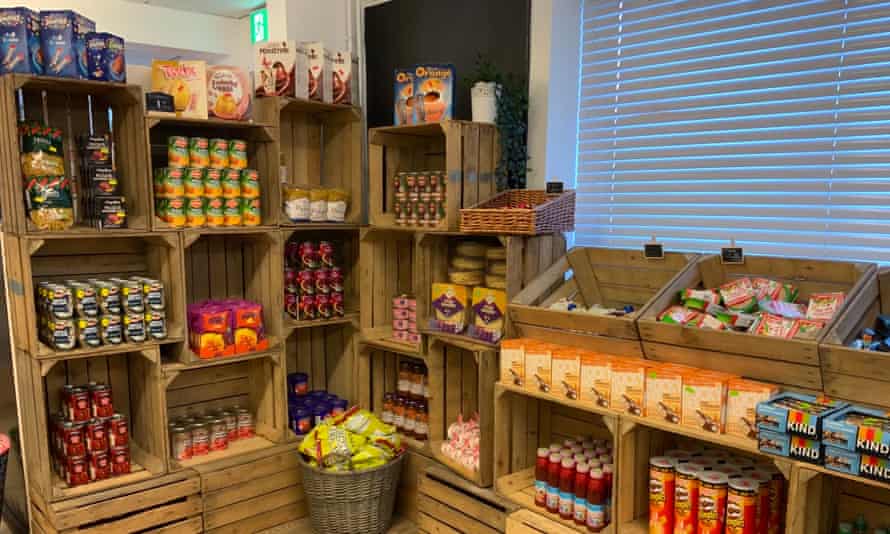Fur Clemt, meaning “very hungry” in Wigan dialect, is a much-loved community supermarket which sells unsold or overproduced food at a heavily discounted price to local people struggling with their household budgets. Since December, its owner, Shirley Southworth, has observed a shift: “We’ve seen membership soar and become more varied … It’s not just people on benefits, it’s those who are just about managing, people trying to keep their head above water.”
What’s changed is the cost of living crisis, which has resulted in household spending rising most for those on the lowest incomes, who have the smallest margins and are unable to cut down on luxuries. This is not just the 20% of households living in poverty in Pemberton, where Fur Clemt is based, but also many families who are better-off.
For Southworth, the volunteer-run organisation is about local people taking control. “It’s about doing something for yourself and not having it done to you … Wigan is a Labour-run council and they’re really supportive, but I’m not sure with central government there’s much connection between what’s going on on the ground and what they perceive.”
Her scepticism is reflected in new polling of 2,164 people, which showed that just 14% trusted the government to solve the cost of living crisis, according to New Local, a thinktank that represents councils and advocates for community-run services. More than two-thirds (68%) argued that more power should be given to local communities to tackle the issue themselves, and nearly four-fifths (79%) said Westminster and Whitehall were making decisions “about people and places they know little about”.
This may help explain Conservative losses in the local elections, which have been interpreted as punishment from voters dissatisfied with the prime minister’s perceived failure to tackle the impact of soaring inflation – expected to reach 10% this year – and the biggest annual decline in living standards since records began in 1956.
Fur Clemt is one of a growing number of community-led organisations which, exasperated with a lack of government support to tackle the cost of living crisis, are taking matters into their own hands.

Other organisations include the Ambition Lawrence Weston charity, based in a deprived housing estate in Bristol, which raised £4m to build the tallest wind turbine in England. The revenue it generates will be spent on community projects, while the energy it produces will alleviate fuel poverty for local families.
These projects especially benefit people who would not have expected to need extra support prior to the cost of living crisis, such as working families. Fur Clemt’s model removed the stigma associated with food banks, said Southworth, by marketing itself as an environmental project aimed at reducing food waste and allowing people to buy the food they wanted.
“One lady comes in twice a week and said she took her children to Legoland on the savings she had made, and she wouldn’t have been able to afford to do that otherwise. It gives families the opportunity to make savings. It might be to buy electricity or gas, but it might also be to treat the kids to something,” she added.
Southworth works with Wigan council and community groups to reach the most vulnerable, including domestic violence survivors and homeless people. She also runs cooking classes on how to use the food in stock, and is negotiating fuel vouchers with an energy company to offset soaring gas and electricity costs.
To enable more organisations to emulate Fur Clemt, New Local is calling for the government to introduce a community power act, which would devolve power to councils and local people to give them a greater say over public spaces, services and local investment. The thinktank says this differs from David Cameron’s much-derided “big society” because the state would adequately resource communities and voluntary organisations, for instance by giving them 25% of the levelling up budget, which at present prioritises large-scale infrastructure projects.
The New Local chief executive, Adam Lent, said: “Rather than struggle for half-baked, top-down solutions, the government should trust and resource communities to tackle the issues that are affecting them directly at a local level. That would really be giving back control.”
Sign up to First Edition, our free daily newsletter – every weekday morning at 7am BST
A government spokesperson said this was under way through London-style devolution deals, which aimed to put “power into the hands of those who know their communities best” by 2030. He added that the government was boosting councils with extra funding, while changes to universal credit and direct support for bills would help working families.
For projects such as Fur Clemt, extra funding could not come soon enough, Southworth said. “Funding always helps because we can pass that on in various ways to the community. Our costs are rising as well. We have to collect our food, and the van and fuel costs are going up. It’s an expensive project to run and it’s getting more expensive, especially with the price of gas and electricity going up.”